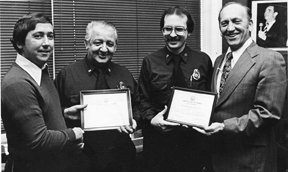“Once all these women got on the school board, I knew it was time to get out,” Jimmy Farina joked last week as he came to grips with closing a chapter in his life.
Farina has spent more than half of his 62 years serving on the Hoboken Board of Education, an unpaid position of civic service that can amount to headaches and costly elections. Over that time, he also has gotten recognition in other local arenas, including fighting to help the first girl play in Hoboken Little League, and promoting political candidates through an organization called the “Young Dems.”
He and his allies were accused of nepotism and putting friends on the payroll.
________
While he is leaving his volunteer position as a school board member, he remains in his salaried job of city clerk at City Hall.
First election
First elected to the school board at 27, Farina had already immersed himself in politics.
“Nixon was president,” he said, “and, no, I didn’t have anything to do with Watergate.”
Until 1974, the school board was appointed by the mayor, but that year, voters decided to make the board elected positions on a ballot referendum.
Mayor Steve Cappiello called Farina after the young man had made a failed run at the City Council, and asked, “How would you like to be on the school board?”
Farina agreed. But on the campaign trail, he found that most members of the public still didn’t understand that the school board election was open to the public. Or even what the school board was.
“We came out of the dark ages [for the school board] from…’74 to ‘80,” he said. “Nobody knew where the school board meeting was.”
Once elected, he called Cappiello back: “Alright, I’m elected, Steve. What do I do now?”
Cappiello told him to follow the lead of long-time board member Otto Hottendorf, who himself spent 38 years on the board.
Teachers strike
Within weeks, Farina was smack in the middle of the last teachers’ strike in Hoboken, which lasted over a month.
The board wasn’t willing to give in to the teachers’ union, but they were determined to keep the schools open.
Once the administrators walked out too, it was up to the board members to keep the doors open.
Farina said the school superintendent asked the board members to volunteer to supervise a school; Farina took Connors School.
The next morning he got a call from the superintendent at 8:45 a.m. “Why aren’t you at the school? You have to be in the building by 8:30,” Farina recalled him saying.
“After it was all over, [the teachers] got a better deal than ever,” he said. “I’m a street man; I’m educated from the streets…If I knew then what I know now, it would have never happened.”
Elected or appointed
The City Council overturned the voter referendum and returned the school board to appointed positions. Farina was appointed twice by Cappiello during that time. At that time, the public also had no say over the school budget; it was created by a committee of the mayor, two school board members, and two city council members.
Political struggles over the board continued, and the board was again changed from appointed back to elected positions. Also, the membership was reduced from nine members to seven. Today, it is back to nine. (The election for new members is this Tuesday; one will replace Farina.)
Nepotism? Well…
When the size of the board was reduced, Farina almost lost his seat, but instead it was Dick England and Don Pellicano who were removed, since they were the last members appointed.
“They wanted to get me off the school board, but I said, I’m not leaving,” Farina recalled.
He noted that he and his allies were accused of nepotism and putting friends on the payroll.
“Part of it’s true, but they were all qualified,” he said.
Attention to athletics
Farina has always been interested in sports, and he brought that fervor to the schools.
Politics and sports intertwined for him at the Sixth Street Social Club, which spawned an influential political group called Young Democrats of Hoboken. Farina was a founder.
“Most of my friends, the members, were involved in athletics,” he said.
He made many efforts to include women in the sporting scene, including championing Title IX, which required equal funding for women’s sports. He also was instrumental in allowing the first female in the country to play in Little League baseball.
A girl named Maria Pepe wanted to play in Hoboken Little League, and Farina okayed it. By the time that courts allowed her to play, she was too old, but Farina and others had championed the cause. It blazed a trail for other girls to participate.
Farina was a key figure in rebuilding the football stadium at Hoboken High School, which was so run down, Farina said it was called the “Dustbowl.”
Farina asked Cappiello if he could put a capital improvement question on the school board election ballot. Farina said the mayor told him, “I don’t think that’s going to work.” But Farina convinced him, and the voters agreed.
It became one of the first athletic fields in the state with artificial turf, and Farina was honored a few years ago when the school district named the field house after him.
“One of the things that I’m very proud of,” he said, “is standing on the stage at graduation [and hearing all the scholarships read], not only in athletics, but in academics too.”
Timothy J. Carroll may be reached at tcarroll@hudsonreporter.com.
